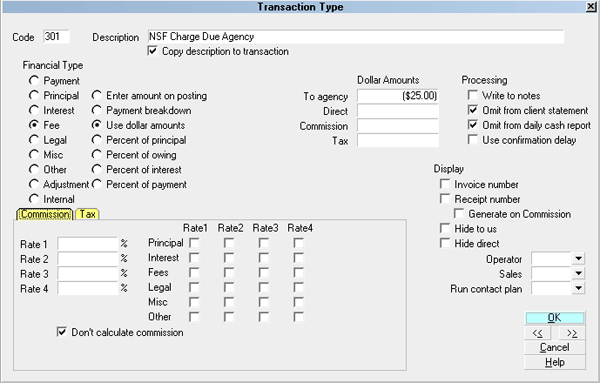Transaction Type Sample - NSF Charge Due Agency
Let's assume that an operator posts a check payment to
a debtor account. A few days later, the check is returned
to you NSF.
Do you need to charge a fee for this check payment that
was returned to you as NSF?
If the answer is 'yes', the NSF Charge Due Agency is a
Fee transaction type that you can use to post this NSF
fee to an account.
The screen shot below shows the settings for the
NSF Charge Due Agency Transaction Type.

NSF Charge Due Agency - Fees Transaction Type
The rest of this document explains the settings shown
above.
By default, Collect! ships with a number of Fee type
transaction samples. These are Transaction Types in the
Other Expenses, or 300 series, that have "Fee" selected
for Financial Type in the Transaction Type settings.
Collect! uses codes between 300 to 399 for other expenses,
such as an NSF Account fee, but it is actually the "Fee"
dot in the Financial Type that causes Collect! to process
the transaction as a fee.
Collect! regards an agency or miscellaneous fee those
dotted as "Fee" for Financial Type, "Legal" is reserved
for Legal fees (and Collect! generally reserves the 200
series for these.)
You can have many different agency fee transaction types
for separating the various types of fees that you may need
to enter. Collection Fee, Closing Fee, Late Fee,
Service Charge and NSF Charge Due Agency are a few
examples.
A check mark in the box labeled Copy
Description To Transaction copies the Description
from the Transaction Type form when you create
a 301 NSF Charge Due Agency transaction on a
debtor account.
The Fee radio button is dotted to keep track of fees
charged to an account.
Any transaction flagged as a Fee type, with an amount
either in the To Us or Direct field, will affect the balance
of the Fee amount displayed on the Debtor form.
All Fee transactions are totaled together and the result
is displayed in the Fees field of the Debtor form.
The radio button labeled Use dollar amounts
is selected and a fixed amount has been entered in
the To Agency field. Entered as a NEGATIVE
amount, this adds to the debtor's Fees amount.
The amount in the To Agency field is a NEGATIVE value. When
an NSF Account Fee transaction is posted, this amount is displayed
in the transaction's To Us field. In the sample,
this would add $25 to the debtor's Owing when an NSF Charge
Due Agency transaction is posted to an account.
Reporting check box, Omit from client statement,
is switched ON with a check mark to omit this transaction when
creating a statement for your client. The decision to switch ON this
setting depends on how you handle fees and what you want to
show your client.
Reporting check box, Omit from daily cash report,
is switched ON with a check mark to omit the transaction when
generating the Daily Cash Report. This transaction is not part of the
cash flowing into your agency.
Don't calculate commission is switched ON
with a check mark so that commission is not calculated on
this transaction.
Don't calculate tax is switched ON with a check
mark so that tax is not calculated on this transaction.
 The way you handle your business will help you
decide whether or not to enable any other optional settings.
The way you handle your business will help you
decide whether or not to enable any other optional settings.
Display is set to leave both the To Us and the Direct
fields visible at all times when viewing the transaction
or Transactions List.
No operator or sales operator ID's have been set to be
used as default values when posting this transaction
type. You may want to set the Operator or Sales values
to HSE or OWN, if you wish to always have operator and
sales operator ID's on every transaction.
No contact plans have been set to be run when posting
this transaction type.
No commission rate has been set to override the
commission rate that may be set on the Debtor form.
All the above settings will be automatically filled in for
you when you post a 301 NSF Charge Due Agency
transaction to an account. You may override any setting
when posting the transaction.
The NSF Charge Due Agency transaction type has been
set up specifically for those times when a check payment
comes back to you as NSF and you need to charge an
NSF fee.
If you need to charge NSF fees for other types of
accounts, please use one of the other Fee Transaction
Types demonstrated in the samples.
See Also
- Transaction Type Basics - Introduction/Accessing
- How To Post Debtor NSF Fees

| 
Was this page helpful? Do you have any comments on this document? Can we make it better? If so how may we improve this page.
Please click this link to send us your comments: helpinfo@collect.org